The Black Character's Fate In 'Armageddon Time' Is 'Vexing.' That's The Director's Point.
- Oops!Something went wrong.Please try again later.
- Oops!Something went wrong.Please try again later.
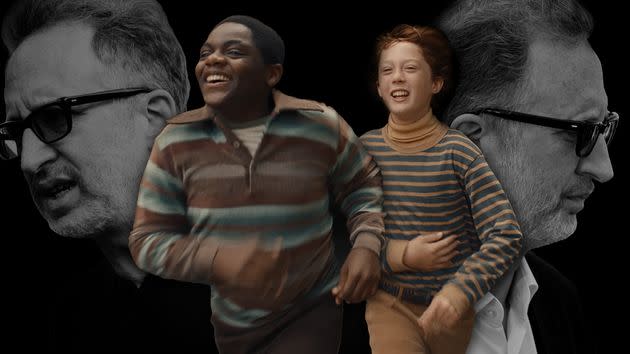
Johnny (Jaylin Webb), left, and Paul (Michael Banks Repeta), right, are at the center of James Gray's semi-autobiographical film "Armageddon Time." (Photo: Illustration: Benjamin Currie/HuffPost; Photo: Getty, Anne Joyce / Focus Features)
This story discusses plot details of “Armageddon Time.”
Within the first six minutes of “Armageddon Time,” writer-director James Gray shows us a moment ripped from his own life as a child growing up in Queens, New York. It’s a moment so casually perturbing, some viewers might not even clock it.
It’s 1980, and Johnny (Jaylin Webb), a 12-year-old Black boy, and Paul (Michael Banks Repeta), his white classmate, have just been reprimanded by their teacher, Mr. Turtletaub (Andrew Polk), for separate instances of insolence. As per their punishment, they’re washing the chalkboard at the front of class, in front of the other students, when Paul steps out of line once more and makes fun of their teacher behind his back.
Without turning around, Mr. Turtletaub, who is consistently hard on the one Black kid in his class, scolds Johnny for what Paul did. Paul shoots the teacher an aghast look, and Johnny objects, though it’s in vain: Mr. Turtletaub has already made up his mind about him. But it’s what happens next that sits in your gut for the rest of the movie.
Once the two are alone, Paul (a stand-in for Gray at that age) tells Johnny that he “would have said something if you got into any real trouble.”
Who knows what ”real trouble” means to Paul, after having just watched Johnny ― a kid with NASA aspirations who lives with his Alzheimer’s-afflicted grandmother ― get repeatedly debased in front of a roomful of his peers.
For that matter, it’s hard to tell at this point what Paul would have actually said if Johnny got into the kind of trouble he’d consider worth speaking up against.
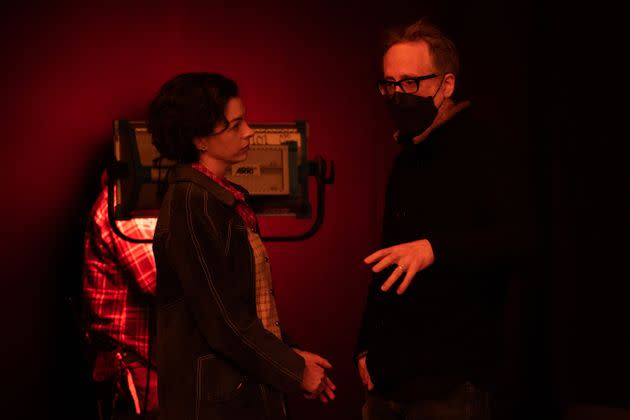
Anne Hathaway and director James Gray on the set of "Armageddon Time." (Photo: Anne Joyce / Focus Features)
“Armageddon Time,” which has been both widely praised and criticized as a “white guilt manifesto,” is made up of a lot of these kinds of disquieting moments.
They seem to illustrate a filmmaker who wants to take a closer look at his own complicity and flawed understanding of privilege during a formative time in his life. In doing so, though, Johnny’s character is rendered a tragic, fragmented human through young Paul’s narrow point of view.
This does make you wonder whether “Armageddon Time,” while an artfully complex movie, is in fact a reflection of Gray wrestling with a sense of guilt.
The filmmaker considers the question. “I mean, the white guilt thing — it doesn’t really have a whole lot of meaning for me as a term,” Gray tells HuffPost. “What I can tell you is that I was trying to illustrate the multiple layers of what we might call privilege that exist.”
It’s the relativity of privilege that “Armageddon Time” first successfully examines, then disarms. Because that’s a flawed logic in a story whose protagonist, by default, hit the privilege lottery simply by being born a white boy in America. Full stop.
Still, we also see Paul’s white Jewish, working-class family — including mom Esther (Anne Hathaway) and dad Irving (Jeremy Strong) — deeply assimilated into white American culture. They’ve long gone by “Graff” since changing their Ukrainian surname, one of the last things that connected them to their cultural struggle. And they’ve adopted the same racism as their white peers.
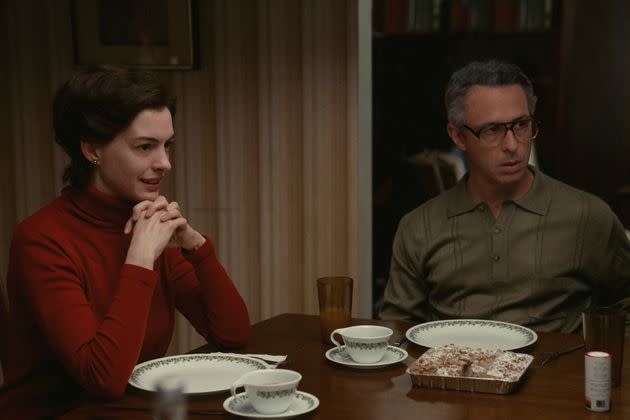
Esther (Hathaway) and Irving (Jeremy Strong) in a dinner scene from "Armageddon Time." (Photo: Joyce / Focus Features)
“You can be oppressed, but at the same time you’re oppressed, you are an oppressor,” Gray said. “To me, that’s what the film is about.”
Esther forbids Paul from hanging out with “that Black boy” after the children are caught smoking a joint in the school bathroom, and Irving shouts at Paul to put down the “ching chong cho” menu when he tries to order Chinese food instead of eating his mother’s home-cooked meal.
Paul’s parents, a teacher and a plumber, drive by nice houses just to gaze wistfully at what they can’t afford. They frequently remind their children not to be wasteful.
For the director, it comes down to perspective, which he wanted to illustrate in “Armageddon Time.” In real life, his father was a boiler repairman, and Gray recalls his mother using food stamps at the supermarket.
“If you said to [my father], ‘Dad, you are the beneficiary of white privilege,’ my father’s reaction at first would be, not only befuddlement and confusion, but probably also a measure of hostility and anger at me for saying such a thing,” Gray said.
But, Gray said, with a little more explaining, the point would probably have hit home. “If I then talked about it with my father — who was a pretty clearheaded person in many ways — and I talked him through the steps of what it is that got him to his place in the world, he would begin to understand.”
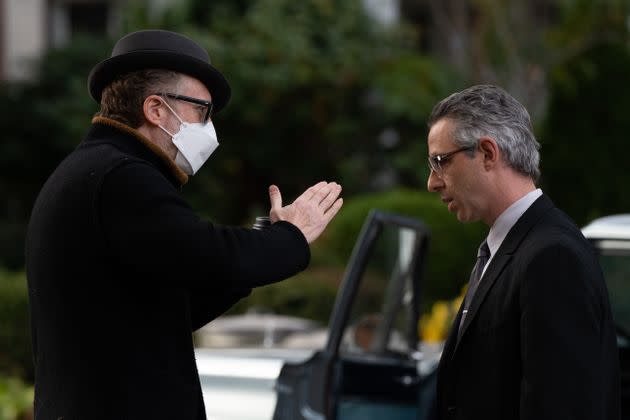
Gray and Strong on the set of "Armageddon Time." (Photo: Anne Joyce / Focus Features)
The reality of those steps is precisely why Gray takes issue when people say things like Everybody can make it in America as long as they pull up their bootstraps and try hard enough! ― a spurious sentiment that he includes in “Armageddon Time” by way of an event that happened in real life.
It’s during a scene where Maryanne Trump (Jessica Chastain), sister of Donald, delivers a searingly ignorant speech at Paul’s new private school, where his parents transferred him soon after he was caught smoking the joint with Johnny.
Gray himself was again confronted with this everyone-is-given-a-chance concept at a dinner he attended with his wife, where a female investment banker was saying the same thing.
“I said to her finally, I couldn’t take it: ‘But that’s like saying everybody can win the lottery,’” Gray recalls. “I understand that everybody can — I could be hit by a meteor. Luck, fortune, privilege play huge roles in where we sit in the culture, and I know it.”
It’s clear that Gray has at the very least been actively confronting the issue of privilege in his own life. And in speaking with him just days before the midterm elections, he admitted he was “concerned” about it all.
“American democracy is in a pretty troubled place,” he said. “It weighs on me. I had a personal interaction with the Trumps, and felt like I had to impart some idea about this notion of privilege through that prism, because [Donald Trump is] a major figure in American life, and still is, and is now threatening to come back.”
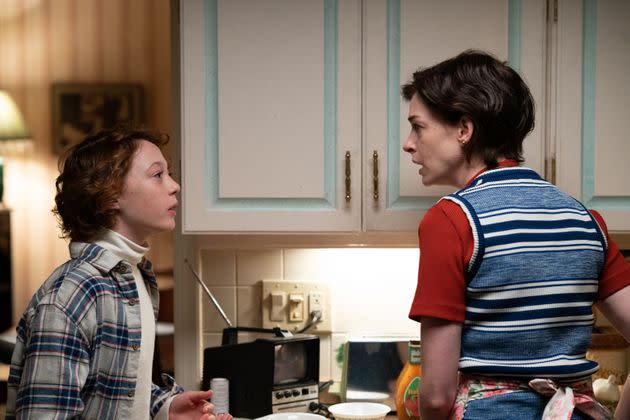
Paul and Esther in "Armageddon Time." (Photo: Anne Joyce / Focus Features)
But what about Paul (or Gray as a child)? At 12 years old, he’s at a precarious stage in his life when he’s largely unaware of politics and the complexities of privilege ― but at various points throughout “Armageddon Time,” he very much benefits from his own.
Paul claims, like Gray says he also did at that age, that Muhammad Ali and the Beatles — all figures known in part for their unapologetic racial and political advocacy — are his heroes. But what actual admiration does a boy with little political awareness, in part because of his parents’ distant relationship to social justice, really have for them?
Another reminder of Paul’s age (and Gray’s at the time) is that his reverence is linked to Ali and the Beatles appearing in Mad magazine and on “Sesame Street.” To Paul and his brother, Ted (Ryan Sell), they are “figures of integrity,” even though their political importance is largely an enigma to them.
“Part of it was that I remember, sort of out there in the culture,” Gray says. “I found out also about Ralph Nader, of all things, in Mad magazine — all these weird sort of late ’60s, early ’70s disparate figures who counted for social justice. But my parents didn’t give us that.”
He considers this some more. “I think, honestly, when I look back on it, so much of their struggle — and this is not to excuse, by the way, may I make this clear — a huge blind spot in how they raised us. But they really had a daily struggle about putting food on the table in a way that I think they kept that from us a bit.”
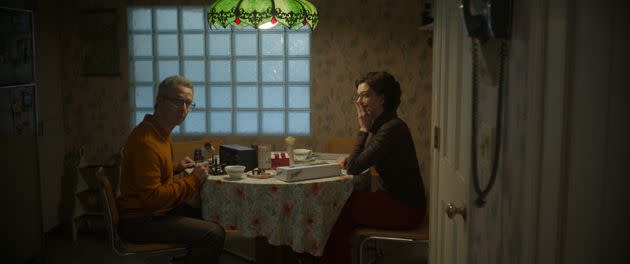
Paul's parents, Irving and Esther, in "Armageddon Time." (Photo: Courtesy of Focus Features)
Gray added that his parents needed to rely on his grandparents for financial support, as Paul’s parents do in the movie for Paul’s private school tuition.
“But when that’s the case, no, they didn’t care,” he continued. “You’re quite right. They didn’t care about inculcating us about Ali’s stance against Vietnam or John Lennon’s Bed-in or whatever. I mean, that stuff — totally out of their idea of anything.”
While this adds some context to Paul and his damning passivity in the film, it doesn’t make him any less frustrating to watch. “I’m not seen as a great guy,” Gray acknowledges. “I’m not letting myself off the hook.”
And he shouldn’t. Maryanne’s father, Fred Trump (John Diehl), also speaks to Paul’s private school class, which includes students who snicker and drop the N-word after they see a desperate Johnny trying to talk to Paul through a schoolyard fence. The elder Trump informs Paul and his classmates that they are “the elite.”
Paul, meanwhile, only tells his new classmates that Johnny is somebody from his old school: “I don’t really know him.”
You couple that moment with Paul telling his grandpa (Anthony Hopkins) that he did “obviously nothing” when the kids at his new school said bad words about Black kids. And Grandpa telling Paul to, on one hand, “be the mensch” for Black kids like his friend Johnny and, on the other, blend in with his new classmates because he deserves to be there just like them.
You start to recognize a pattern.
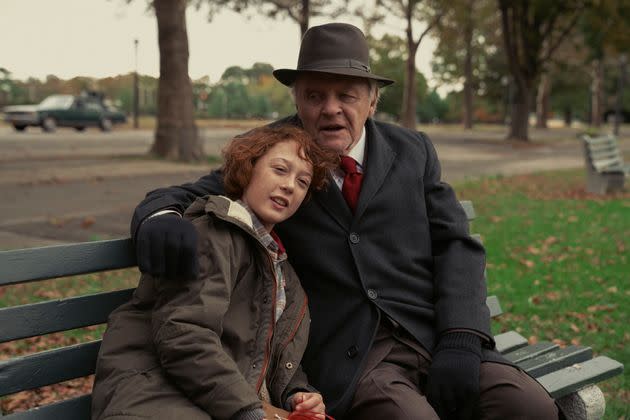
Paul gets some complicated advice from his grandfather (Anthony Hopkins) in "Armageddon Time." (Photo: Anne Joyce)
“There is tremendous cognitive dissonance given to that kid, Paul,” Gray said. “Grandfather even. Yes, he says ‘Do the right thing.’ He also says, ‘I was the victim of prejudice, but you can fit in.’ In other words, be part of the system. And that is the person that Paul loves the most.”
These themes — including double-sided bigotry, privilege and assimilation — are the kinds of things Gray says he put in the film for the audience to debate. “It’s about saying, ‘Here is what I saw of the world in, frankly, all of its darkness,’” the director said. “A lot of awfulness. Make heads or tails of it for yourself.”
It’s an unflinching and deliberately narrow portrait of a young white boy with an unformed mindset absorbing many conflicting messages, with nary an expectation that he’ll actually do the right thing. It makes “Armageddon Time” a tougher and tougher pill to swallow as it goes on.
Because it’s the factor of choice that makes freedom ― and the elusive American Dream that’s little more than a rotten apple at the core of this film ― so alluring. Paul has many choices, most of which he makes poorly. Johnny doesn’t have any.
In fact, “Armageddon Time” culminates in Paul taking one last ruinous measure that helps close the book on Johnny for good. And it brings us back to the earlier question of what Paul would actually say or do if Johnny got in any “real trouble” ― or if it would even matter.
Because that opportunity presents itself toward the end of the film, when the boys are arrested for stealing and attempting to pawn a school computer, which Paul convinces Johnny to do with him. Paul confesses to the cops that it was his idea. But Johnny, in a truly wrenching move, tells the police it was actually his decision. “It don’t make no difference,” Johnny says to Paul.
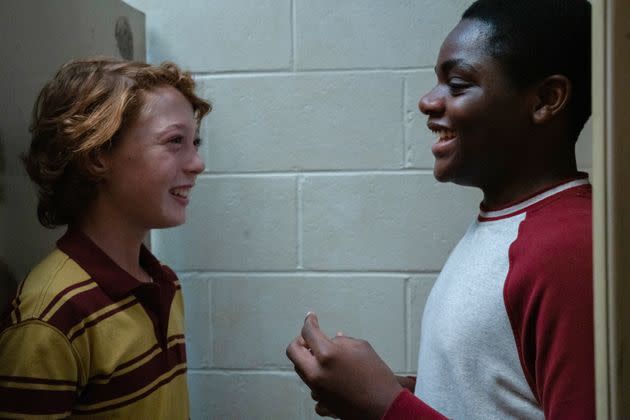
Paul and Johnny have a case of the giggles in a scene from "Armageddon Time." (Photo: Anne Joyce / Focus Features)
Whatever they say is neither here nor there, because it is Johnny who’s last seen alone, through a glass, in handcuffs, while Paul walks out of the police station with his dad. Anyone with an understanding of what it was like for Black folks in 1980 New York can guess at any number of atrocities that could and probably did happen to Johnny.
This unknown detail is part of what makes “Armageddon Time” such a distressing experience, because we don’t intimately know a lot about what Johnny is up against, beyond his fear of being thrown into the foster care system. In real life, Gray had only been to his friend’s house once. Selling the computer was supposed to be Johnny’s ticket to a better life, and we see his excitement about that plan before it collapses.
Still, Gray recognizes his and Paul’s shortsighted view into Johnny’s life.
“I mean, that was part of the point, though,” the filmmaker said. “We’re not supposed to see into Johnny’s world completely. That is an important story to tell, and I’m not the person to tell that story. I can only tell my story. If I tried to tell that story, it would be almost risible. I tried to give a glimpse into his life.”
“A point of the movie is that you can never know the other side,” he added. “Even if you think you do. That’s part of what’s so vexing about it. You are meant to be troubled by it. It’s an anguishing thing because it’s awful. The system is punishing to [Johnny].”
The film illustrates Gray’s complacency then, and as he puts it, it shows “the ease with which white people can and do marginalize and ignore the lives and experiences of Black people.”
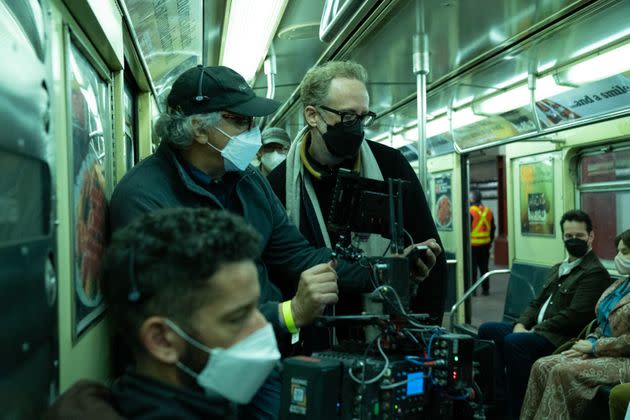
Director of photography Darius Khondji, left, and Gray on the set of "Armageddon Time." (Photo: Anne Joyce / Focus Features)
That said, where does that leave Paul’s consciousness by the end of “Armageddon Time”? Adding to the film’s troubling elements, the answer is “nowhere.”
But as much as we lament films by white male directors that end their race-themed narratives with the white lead learning a valuable lesson — think “The Help,” “Green Book” and myriad others — there’s a grim acceptance in knowing that this one just doesn’t do that.
“As a creative person, you’re trying to do something where you’re expressing a problem as you see it, and not necessarily giving an answer,” Gray said.
After Irving picks up Paul from the police station, he recognizes that Johnny is still apprehended while Paul is with him in a car, steps away from their warm home. But Irving doesn’t offer much advice beyond, “You have to be thankful when you’re given a leg up.” And Paul is left to think about whether he really behaved like the mensch Grandpa encouraged him to be.
“I don’t know what I should have done,” Gray admitted. “I don’t know what to do. I mean, I can contribute to the world as best I can.”
“Armageddon Time” is at once a reflection of a specific time in its director’s life and a look at a cycle of privilege that’s still repeating and repeating. It’s ugly, aggravating and, for Gray, necessary.
“It’s not pretty,” Gray said. “But it is beautiful because part of our job as creative people is to shine a light on, sometimes, things that are not so pleasant. Honesty is beautiful. I was trying to show from, my point of view, my story and what I thought was pretty fucked up.”
This article originally appeared on HuffPost and has been updated.
